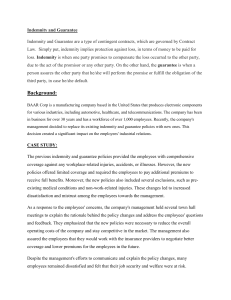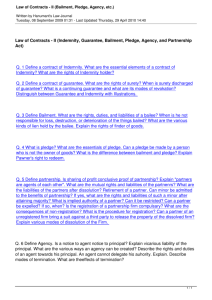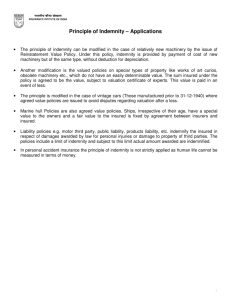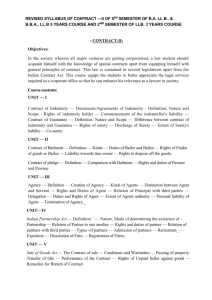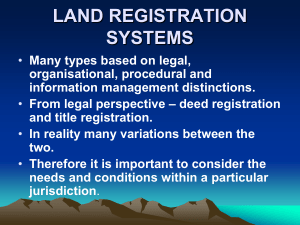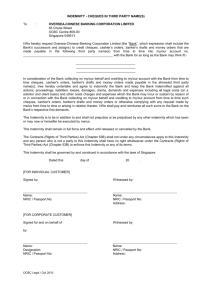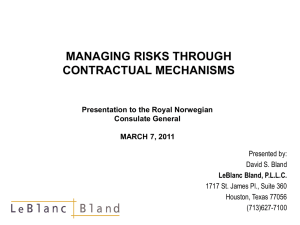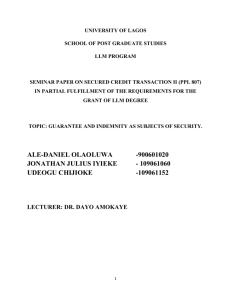The Contract Act-1872
advertisement
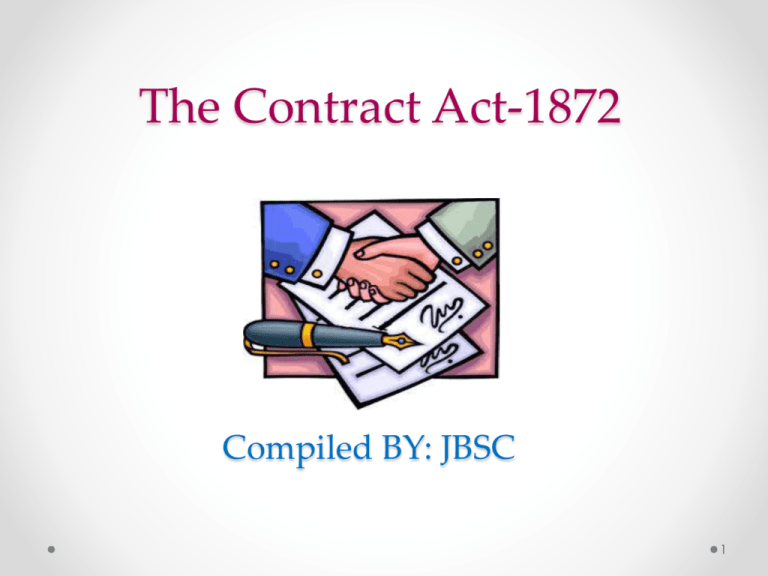
The Contract Act-1872 Compiled BY: JBSC 1 Why Contract Act ? • According to Sir Willium Anson – “The law of contract is intended to ensure that what a man has to expect shall come to pass and that what has been promised to him shall be performed” The objective is – - to ensure that the rights and obligations arising out of a contract are honoured - legal remedies are made available to an aggrieved party against the party failing to honour his part of agreement. 2 What is Contract Act ? • Contract Act 1872 (Act No. IX of 1872) governs the law of contracts in Bangladesh. The Act came into force in Bengal on 1 September of 1872 . • This Indian Contract Act of 1872 is the foundation of law of contract introduced by British law was adopted in Bangladesh without change. • The Act has 238 sections under its 11 chapters. 3 Definition of Contract • “An agreement enforceable by law is contract”. -Section-2(h) of the Contract Act-1872 CONTRACT = AGREEMENT+ENFORCEABILITY AT LAW • “Every promise and every set of promises, forming consideration for each other is an agreement” –Section-2(e) of the Contract Act-1872 AGREEMENT = OFFER + ACCEPTANCE + CONSIDERATION ‘All contracts are agreements but all agreements are not contracts’ 4 Definition of Contract • “ When, at the desire of the promisor the promisee or any other person has done or abstained from doing something, such act or abstinence or promise is called a consideration for the promise .” - Section 2 (d) of the Contract Act • Combining two sections aforesaid, we can opine that“Contract is an agreement between two or more parties which is supported by consideration and enforceable by law” 5 Interpretation clause (a) When one person signifies to another his willingness to do or to abstain from doing anything, with a view to obtaining the assent of the other to such act or abstinence, he is said to make a proposal . (b) When the person to whom the proposal is made signifies his assent thereto, the proposal is said to be accepted. A proposal, when accepted becomes a promise. (c) The person making the proposal is called the “promisor” (d) The person accepting the proposal is called the “promisee” 6 The Essential Elements of Contract • An agreement becomes enforceable by law when it fulfills certain conditions. These conditions are the essential elements of contract which are as follows : 1. Offer and Acceptance : There must be a lawful offer by one party and a lawful acceptant of the offer by the other party or parties. 2. Intention to create Legal Relations: There must be an intention (among the parties) that the agreement shall result in or create legal relations (Ch-3). 7 The Essential Elements of Contract 3. Lawful consideration: An agreement to do something for nothing is usually not enforceable by law. (Ch.4) 4. Lawful Object : The object should not be illegal or immoral or opposed to public policy . (Section-23) 8 The Essential Elements of Contract 5.Capacity of parties : Sec-11Contract Act-1872 & Section 3 (1) & (2) of the Majority Act-1875 – “Every person is competent to contract who is of – the age of majority sound mind and not disqualified from contracting ( by any law to which he is subject.) Insolvency Act-1997 • (As per Section 12 of Contract Act-A person is said to be of sound mind for the purpose of making a contract if, at the time when he makes it is capable of understanding it and of forming a rational judgment as to its effect upon his interests) 9 The Essential Elements of Contract 6. Free consent : There is absence of free consent if the agreement is induced by – a) Coercion b) Undue influence c) Misrepresentation d) Fraud e) Mistake 10 The Essential Elements of Contract 7. Writing and registration : An oral contract is a perfectly good contract except in those cases where writing or registration is required by some statute. • In law writing is required in case of lease, gift, sale and mortgage of immovable property, negotiable instrument, Memorandum and Articles of Association of a Company (Section-25) 8. Certainty: “agreements, the meaning of which is not certain or capable of being made certain, are void” (Section-29) 9. Possibility of Performance :An agreement to do an act impossible in itself is void . (Section-56) 11 Kinds of contract Contracts may be classified from 3 points of view- 1.Enforceabilitya)Valid contract b) Voidable contract c) Void Contract d) Unenforceable e) Illegal Contract 2. Modes of Creation: a) Express Contract b) Implied Contract c) Constructive or Quasi Contract 3.Execution : a) Executed b) Executory 12 Contract Act : At a glance Chapter Particulars Clause Chapter-1 Proposal or offer & Acceptance 3-9 Chapter-2 Voidable & Void contract 10-30 Chapter-3 Contingent Contract 31-36 Chapter-4 Performance of Contract 37-61 Chapter-5 Certain Relations resembling to Contracts 68-72 Chapter-6 The Consequences of Breach of Contracts 73-75 Chapter-7 Sale of Goods 76-123 Chapter-8 Indemnity & Guarantee 124-147 Chapter-9 Bailment 148-181 Chapter-10 Agency 182-238 Chapter-11 Partnership 239-266 13 Why necessary ? • For any individual, it is essential to know the elements of a contract if he is engaged in business or in buying and selling of goods and properties. • It is essential for a banker to know the elements of a contract because a bank frequently enters into contract with the depositors, customers and borrowers. 14 Why necessary for Bankers •Opening of accounts is entering into a contract. Both of the parties i.e. bank and the account holders are bound by this contract. •When a banker advances money to a borrower is a contract with borrower who undertakes to repay. •Under the broad area of indemnity and guarantee, chapter eight defines contract of indemnity, contract of guarantee, surety, and principal debtor and creditor. 15 Indemnity SEC. 124- “A contract by which one party promises to save the other from loss caused to him by the conduct of the promisor himself, or by the conduct of any other person, is called a “Contract of Indemnity”. INDEMNITY Features• TWO parties- Indemnity holder & Indemnifier • Sec. 10- essentials should be satisfied • Rights of Indemnity Holder: • To claim damages • To claim costs & Other payments • All insurance contracts are contracts of indemnity except life insurance. • 16 ESSENTIAL FEATURES OF INDEMNITY There are two persons , the indemnifier the indemnified or the indemnity holder There must be loss either by the promisor’s conduct or by any other person’s conduct It is a contingent contract by nature It may be express or implied Sec125 deals with the commencement of the indemnifier’s liability. His liability commences when the event causing the loss occurs or when the event saving the indemnified from the loss becomes impossible 17 Guarantee • SEC. 126- A “Contract of Guarantee” is a contract to perform the promise, or discharge the liability, of a third person in case of his default. The person who gives the guarantee is called the ‘surety’. • The person in respect of whose default the guarantee is given is called ‘principal debtor’. • The person to whom the guarantee is given is called ‘creditor’. • It is tripartite agreement. 1- principal debtor and creditor. 2- creditor & surety and 3- principal debtor and surety. • 18 Thank YOU 19
